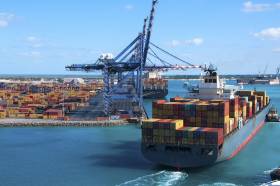Displaying items by tag: Port Reception Facilities
ESPO Welcomes Draft Report but Calls for Stricter Application of ‘Polluter Pays’ Principle
#PolluterPays- European Sea ports Organisation (ESPO) have welcomed proposals put forward by the European Parliament Rapporteur Ms Gesine Meissner in the draft report of the Transport Committee on the review of the Waste Reception Facilities Directive (Com (2018) 33). The Draft Report will be discussed in the Transport Committee meeting of today, 10 July.
The proposals of the Parliament’s rapporteur are aiming to better protect the marine environment and decrease the administrative burden for stakeholders. ESPO welcomes in particular proposals such as the definition of catering waste which would increase the quantities of recycled plastics and contribute to the targets of the European Plastics Strategy.
European ports believe however that the ‘polluter pays’ principle, which has been the cornerstone of the EU’s environmental policy, needs to be strengthened. Introducing a fee system whereby ships would deliver unreasonable quantities of garbage, including dangerous waste for a fixed fee would be a severe divergence from the ‘polluter pays’ principle. It risks to discourage reducing waste at the source.
“The report of Ms Meissner is clearly a step forward. Overall, the report pursues the objectives of the circular economy and aims to reduce administrative burden for authorities and stakeholders. We strongly believe however that the ‘polluter pays’ principle needs to be better reflected in the new Directive. We cannot accept a regime whereby ships are not incentivised to limit waste at the source and ports have to carry the costs of delivering unreasonable amounts. Additionally, we oppose an automatic rebate for “green” ships. Any green rebate, if not corresponding to a real cost reduction, will have to be borne by the port authority. Not all port managing bodies have the financial ability to cover this cost and to give such rebates. We plead for an efficient, but responsible management of ship waste. We count on the rapporteur and Transport Committee members to further optimise the Directive in that sense” says ESPO’s Secretary General, Isabelle Ryckbost.
Any mandatory green rebates for waste, as proposed by the Commission proposal, would prevent ports from addressing local environmental challenges. In some areas, waste pollution is a great environmental concern while in others it is air quality and emissions. Furthermore, mandatory rebates disregard the existence of different business and governance models in ports across Europe.
The Commission has been preparing an EU submission to the IMO proposing a 100% indirect fee without quantity thresholds at international level (here). “I regret that a submission is being introduced to the Council when Parliament has not expressed any views, and negotiations with the Council have not even started. This initiative seems to bypass the ongoing democratic process and lacks legitimacy” adds ESPO’s Secretary General, Isabelle Ryckbost.
#Ports&Shipping - European ports is where ship waste has been one of the main environmental priorities, as indicated in the ESPO 2017 Sustainability Report.
In its position paper on the revision of the Port Reception Facilities Directive, the European Sea Ports Organisation (ESPO) welcomed the Commission proposal and its objective to build upon the substantial progress achieved under the existing Directive.
The existing Directive 2000/59 has contributed to decreasing significantly waste discharges at sea. The minimum fixed fee, which has to be paid by all ships calling at EU ports, regardless of whether they use the waste facilities or of the quantities they deliver, has delivered. As a result, only 2.5% of oily waste is not delivered at waste facilities in ports.
European ports support, in particular, the proposal’s objectives to increase efficiency and reduce administrative burden. The new Directive should, however, also make sure that efficient but responsible regime for managing ship waste is encouraged, in line with the ‘polluter pays’ principle.
“European ports recognise that providing the right incentives is essential and port authorities are certainly willing to contribute. However, introducing a fee system whereby ships could deliver unreasonable amounts of garbage, including dangerous waste for 100% fixed fee, would be a severe and unacceptable divergence from the ‘polluter pays’ principle. It risks to discourage tackling waste at the source by reducing waste volumes onboard, which has been the cornerstone of the EU waste policy” says ESPO’s Secretary General, Isabelle Ryckbost.
ESPO therefore proposes to set a limit on waste covered by the 100% fixed fee. The fixed (flat) fee should cover normal quantities of waste delivered by a certain type and size of ship. Ports should be allowed to charge on top of that if unreasonable quantities are delivered. Furthermore, dangerous waste, which usually needs special and costly treatment, should not be covered by the 100% indirect fee.
European ports believe, moreover, that any provisions leading to better enforcement of the obligation for ships to deliver waste at shore are welcome. The alignment of specific elements of the Directive with the International Convention for the Prevention of Pollution from Ships (MARPOL) is supported by ESPO. European ports also welcome that new types of waste, such as scrubber waste, have been addressed by the proposal.
The proposal is currently being discussed in the Council and the European Parliament. ESPO looks forward to working with the Parliament’s rapporteurs and the shadow rapporteurs, the Bulgarian Presidency, the Council and the Commission in view of achieving a new and efficient legislative framework that would further reduce ship generated waste discharged at sea and increase waste quantities delivered at ports.





























































